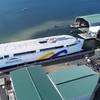BIMCO Develops 2020 Bunker Clauses
The Baltic and International Maritime Council (BIMCO) has developed two bunker clauses to support the implementation of International Maritime Organization’s (IMO) sulphur 2020 regulations, which come into force on January 1, 2020.
The largest of the international shipping associations representing shipowners poited out that the Global Marine Fuel Sulphur Clause for Time Charter Parties was approved by the Documentary Committee at its meeting in Copenhagen on 13 November.
“It is very important that the new sulphur clauses are ready well in advance to allow the parties to prepare ahead of 1 January 2020,” says Peter Eckhardt, chairperson of the drafting committee and Head of Chartering and Operations at Reederei F. Laeisz.
“The Global Marine Fuel Sulphur Clause for Time Charter Parties will help them do exactly that, as it sets out the obligations and responsibilities of owners and charterers to comply with MARPOL Annex VI sulphur content requirements.” Eckhardt says.
The clause states that charterers are obliged to provide fuel that complies with MARPOL requirements, grades and specifications set out in the charter party, and it is a general compliance clause. It also states that charterers must use suppliers and bunker barge operators who comply with MARPOL and that shipowners will remain responsible for the fuel management.
The second clause discussed at the Committee meeting in Copenhagen deals with the transitional period from the end of 2019 to the beginning of 2020. The two clauses will be published as one package.
The clause focuses on cooperation between owners and charterers to minimise quantities of non-compliant fuel on board by 31 December 2019.
It states that any remaining non-compliant fuel on board after 1 January 2020 has to be removed no later than re-delivery or 1 March 2020 – whichever comes first. It also states that removal of non-compliant fuel must be done at the charterers’ cost, while tank cleaning must be done at the cost of the shipowners.










